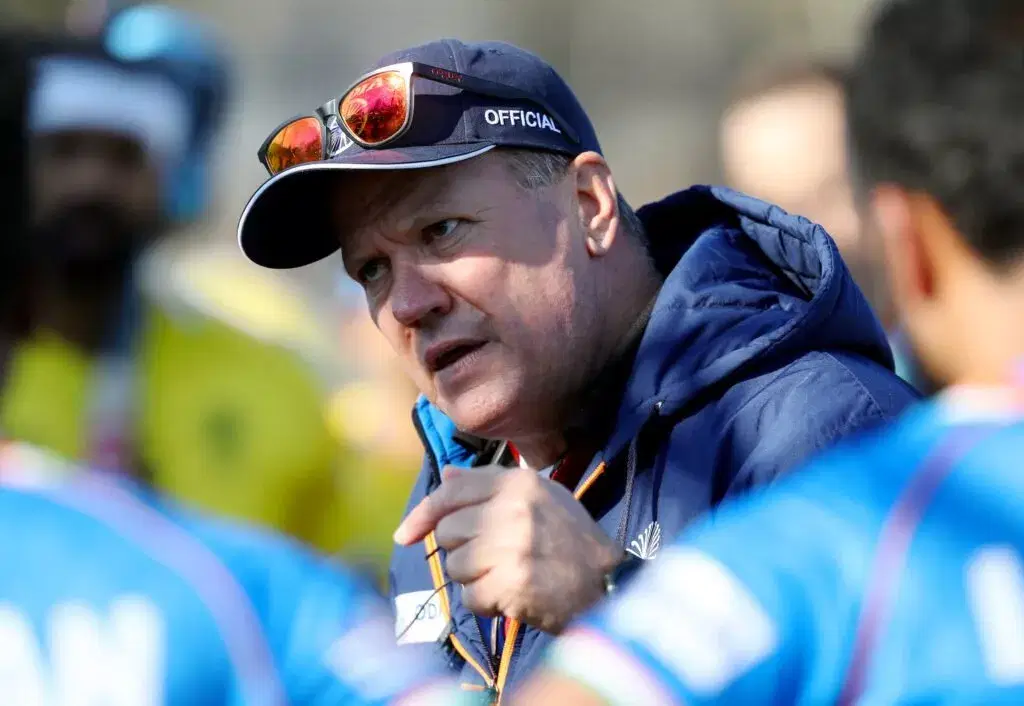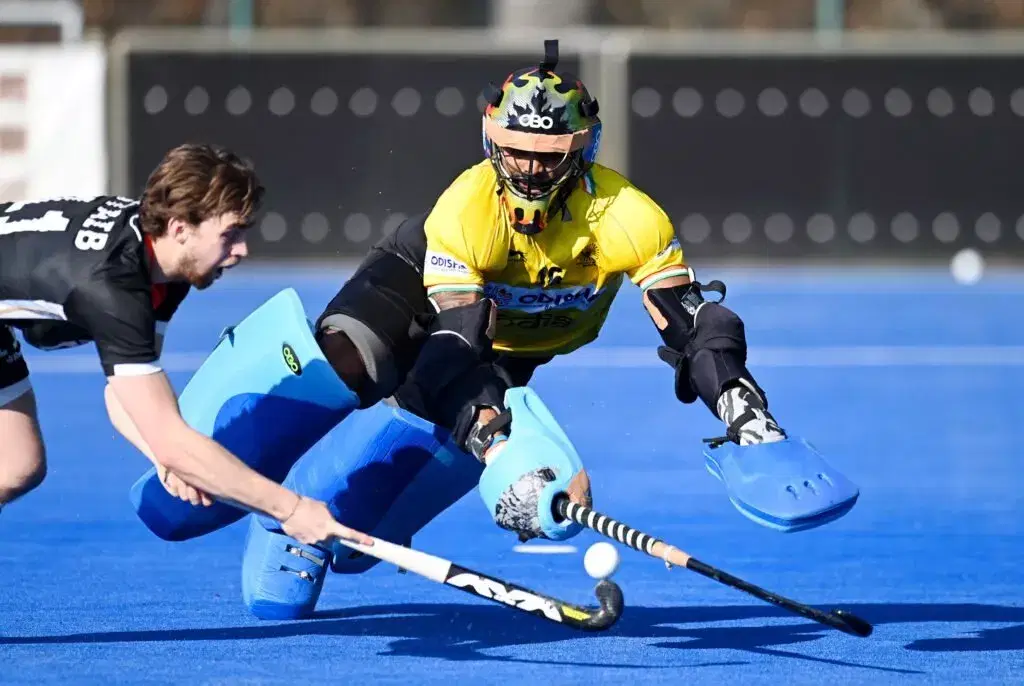Why hockey bronze is worth more than any other Tokyo Olympics medal?

(Courtesy : Hockey India)
This is the first podium finish for the Indian hockey team after 41 years.
The Indian contingent has already bagged several medals in Tokyo. At London 2012, the Indians had bagged six medals, which remains the highest tally so far. However, in Tokyo, there is every possibility that the record might topple. One of those triumphs has been that of the Indian men's hockey team.
The team defeated Germany 5-4 to win the bronze medal match at the Tokyo Olympics. It capped off a memorable tournament for the Men in Blue in Tokyo. The boys will now be coming back home as heroes, having won a long-awaited medal in the sport.
However, this medal in hockey could be worth more than any other medal at the Tokyo Olympics. We dive deep into the reasons why it might be so:
Rejuvenating the sport
The Indian men’s hockey team has had a glorious past in the Olympics like no other. Having claimed an unprecedented six successive gold medals from 1928 to 1956, they went onto add two more in 1964 and 1980. The Indians have also claimed one silver and two bronze medals in hockey, prior to the Tokyo Olympics.
As such, India’s record in the sport on the grandest stage is unparalleled. However, the country has gone through some difficult moments in recent years. Since reaching the lowest ebb of failing to qualify for the 2008 Beijing Olympics, the team has bounced back. There has been a resurgence over the last decade.
After the dubious distinction of failing to qualify for the Olympics in 2008, the Indian team lost all their matches to finish rock bottom at London 2012. This was a major cause of concern, with many thinking that the golden days will never come back. However, in 2013, Hockey India announced the introduction of the Hockey India League (HIL). The HIL last took place in the year 2017, with calls from many former Indian players to restart the league. The league sowed the seeds for Indian hockey’s resurgence and the Indian national team has reaped rewards because of it. This is evident from India’s much-improved showing at Rio 2016, when they reached the quarterfinals.
With this bronze medal triumph in the Tokyo Olympics, the rejuvenation of hockey is complete. The Indians can now build on this success in the coming years.
Bringing hockey back into mainstream sports
Cricket is without any doubt the most dominant sport in the country. Football has also grown rapidly in the last couple of years. However, the popularity of hockey had suffered a slump because of the national team's below-par performances.
However, during the Tokyo Olympics, the entire country has rallied behind the hockey team to spur them on to newer heights. This is not something that has happened often in recent years. Even the Indian government doesn't recognize hockey as the national sport now. Tokyo 2020 completely changes the scenario. There could now be more funds for the sport. More importantly, there is every possibility that more people will now start following it avidly. One medal at the Olympics can change everything.
Setting a benchmark
By achieving a podium finish at the Tokyo Olympics, the Indian men's hockey team has also set a benchmark. A benchmark is extremely crucial for achieving success. It can enable an individual or team to push beyond their limits, in hunger for success.
There are several young players in the current national team setup. With Paris 2024 just three years away, surely the Indian boys will be aiming to do better in the French capital. Having tasted success once, they will be hungry for more. Infact, they will be aiming to go beyond what they have achieved in Tokyo.
Inspiration for next generation players
Youngsters in India have grown up listening to fascinating stories from the past in hockey. However, they haven't seen it for themselves. Surely, a wait of 41 years is way too long. However, this hockey bronze medal in the Tokyo Olympics can be the trigger for even greater successes in the future.
The biggest example in this regard is the sport of wrestling. Wrestler K.D. Jadhav had won India’s first individual medal (bronze) at the 1952 Helsinki Olympics. For 56 years, India did not have a medal to show at the Olympics in wrestling, until Sushil Kumar won the bronze at Beijing in 2008. Sushil has inspired an entire generation of wrestlers and has given them believe that they can go on and compete against the very best. Since then, India has won at least one medal in wrestling at every edition, including Tokyo 2020.
One medal at the Olympics can be the foundation for better things. It will not just befit a unit that has worked very hard over the last couple of years, but will also give India the roadmap for years to come.
Instilling a champion's mentality

In April 2019, Graham Reid was appointed as the new head coach of the Indian men’s hockey team. Reid had earlier been a part of the Australian and Dutch national setup. He was also in-charge of the Amsterdamsche Hockey & Bandy Club (AH&BC), the oldest hockey club in the Netherlands.
The Australian was a prominent international in his playing days. He was a versatile player and played as a defender and midfielder, earning 130 appearances for the Australian national team and going onto score 36 goals. Reid won a silver medal at the 1992 Barcelona Olympics, four gold medals in the Champions Trophy and other major honours.
He thus brought a winning mentality with him to India. Since being appointed as the coach, he has stressed on the mental side of the game. He believes that the Indians have a natural mental strength that they should be able to utilize in adverse situations. He has worked tirelessly during the lockdown after the team secured an Olympics berth during his reign. Graham Reid’s experience at the highest level and winning mentality have been a crucial factor for the team in their success at the Tokyo Olympics.
As such, this is an element that the Indian team lacked in the past. Even after India suffered a heavy 7-1 defeat at the hands of Australia, they didn't let their heads drop. The mentality has changed and an Olympic medal has been achieved. The outlook for Indian hockey will surely be different from here on.
Overcoming the astroturf jinx
There have been talks that after the astroturf pitch was introduced in hockey, the Indians have been unable to adapt to it. In recent years, India have had some brilliant individual players such as Dilip Tirkey, Sardar Singh, Sandeep Singh and many others. However, the team have always failed to deliver on the big stages.
Despite, several members of the Tokyo Olympics hockey squad making their Olympics debut, they were not fazed by the occasion. If there was any talk of difficulty with the astroturf, the Indian team has rubbished those claims with their performances in Tokyo.
Medal under toughest circumstances
The last year and a half has been very difficult for everyone. The COVID-19 pandemic has affected everyone mentally and the athletes are no different. They weren't able to get a lot of minutes under their belt. Infact, the only hockey tours India had prior to the Tokyo Olympics were one to Europe and one in Argentina.
The team did make good use of the few opportunities that they had. The Indian team had a good European tour, headlined by a 6-1 victory over Germany. This was followed by an impressive outing in Buenos Aires. It has been a tough and challenging time. Despite this, there were expectations for the team to perform well at the Tokyo Olympics. Winning an Olympic medal under the current circumstances is unlike any other. Hence, this achievement deserves special credit.
Possibility of players emerging from less popular regions

P.R. Sreejesh was one of the standout performers for the Indian men's hockey team at the Tokyo Olympics. He pulled off several stunning saves time after time at crucial moments in games. Sreejesh's last-minute block off a penalty corner to deny Germany an equalizer will live long in the memories of Indian sports-lovers.
After his heroics and of that of several other players from where hockey is not a very popular sport, there could be a new revolution. Midfielder Nilakanta Sharma is also another example. Hockey is not the first choice when it comes to regions such as Kerala or Manipur, but things could change because of this triumph.
The state of Odisha, which is the home of Indian hockey, has seen the sport grow in the region in the last decade. The likes of Amit Rohidas and Birendra Lakra are from the state and were pivotal members of the history-making Indian squad. In an interaction with the AIFF prior to the Tokyo Olympics, P.R. Sreejesh had said, "The world today knows Odisha as the hub of sports. It’s a super sports hub. When we train in Odisha, it feels like our second home. Nowadays, if you ask kids in Odisha, they don’t want to be IAS officers or get government jobs. All of them want to play sports because they have now seen that you can have good things through sports.” These are words that will echo in the rest of India as well.
The hope is that the success achieved by the current generation of Indian hockey players will revolutionize the sport and make children pick up the stick even in remote areas of this vast nation.
For more updates, follow Khel Now on Twitter, Instagram and join our community on Telegram.
Where passion meets insight — blending breaking news, in-depth strategic analysis, viral moments, and jaw-dropping plays into powerful sports content designed to entertain, inform, and keep you connected to your favorite teams and athletes. Expect daily updates, expert commentary and coverage that never leaves a fan behind.